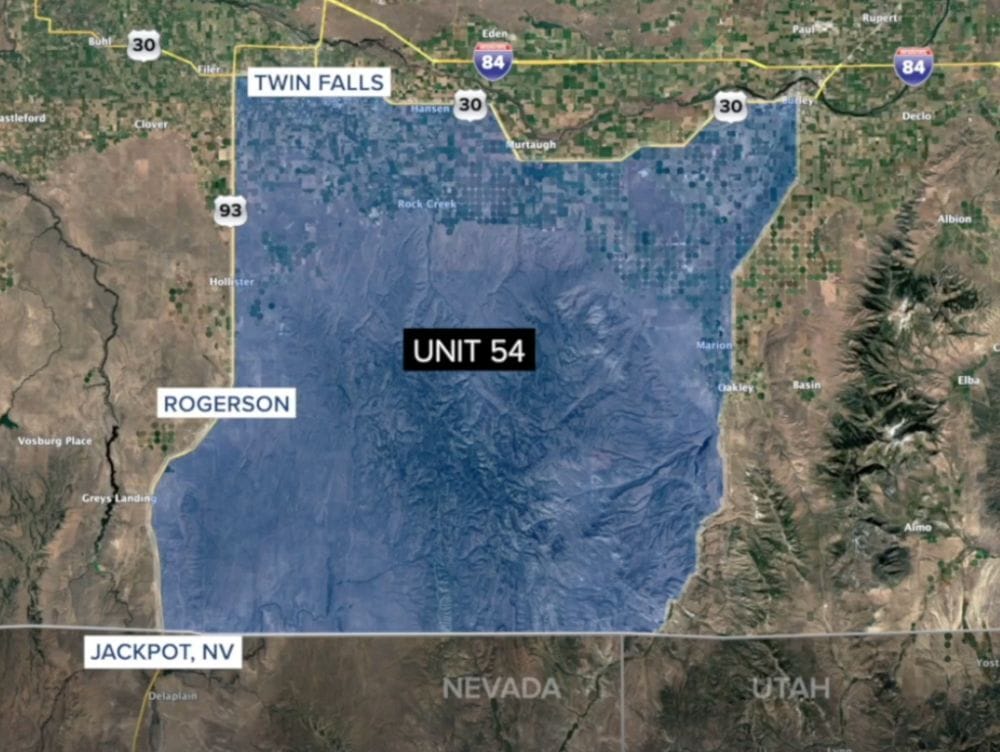
Game Management Unit 54, a rugged stretch of Idaho’s South Hills just north of the Nevada line, is no ordinary deer country. With more than eight hundred miles of roads and trails, it offers easy access, but the state keeps a tight grip on harvest numbers, offering only about three hundred mule deer tags for the area each year. With legal applicants having roughly a nine percent chance of drawing one, many ethical hunters wait a decade or longer for their shot at a mature buck in this coveted unit.
Unfortunately for the legal applicants, none of that mattered to a group of twelve men who were discovered to have turned Unit 54 into their annual poaching playground.
Their operation seemingly ran like clockwork, at least for a brief period of time. Every fall, starting at least as far back as 2017, the group would roll south from Boise and Eagle, camp in the hills, and kill trophy mule deer without tags. They took only the heads and antlers, leaving whole carcasses to rot—an act classified in Idaho as a felony. Photos, videos, and boastful messages flew across cell phones and social media, documenting each illegal harvest with the casual confidence of men who believed they would never be caught.
They were wrong.
The unraveling began in October 2022 with a routine traffic stop near Jackpot, Nevada. Idaho Fish and Game officers pulled over a vehicle towing an enclosed trailer. Inside were five freshly severed mule deer heads, but no coolers large enough to hold the meat from even one animal. When pressed about the animals, the occupants could not produce Unit 54 tags to the investigating officers. What started as a roadside citation quickly snowballed into one of the largest wildlife crime investigations in recent Idaho history.

As the investigation progressed, search warrants were soon granted and investigators seized phones, combed social media accounts, and pulled geolocation data from photographs. Putting the evidence together like a jigsaw puzzle, they later acquired surveillance footage from numerous Jackpot businesses that helped them fill in the gaps. The digital trail stretched back years and painted a damning picture that included the same core group of lawbreakers, the same unit, and the same pattern of waste.
By early 2023, prosecutors had filed 115 criminal charges against twelve Treasure Valley men, eighty-one of which were felonies. At the center stood Robert Zeko, an Eagle business owner facing thirty-four counts, including fourteen felonies for illegal taking, possession, and wasting game. The others that made up the dirty dozen ranged from repeat offenders to one-time participants lured into the scheme by big, beautiful racks.
Court proceedings moved steadily. In 2024, three defendants identified as the least culpable accepted plea deals. Austin Zeko, Bobby George, and Brian Bob George saw serious felonies reduced or dismissed in exchange for guilty pleas on misdemeanor-level offenses. They paid fines ranging from $300 to $5,000, reimbursed Idaho Fish and Game between $475 and $950 apiece, and surrendered their hunting privileges for three years. The remaining nine defendants, including the ringleaders, held out for trial.
On Monday morning seven of the remaining defendants appeared before Third Judicial District Judge Benjamin Cluff in Twin Falls. One by one, they entered guilty pleas. Cluff did not mince words, calling the operation a blatant criminal enterprise that allowed poachers to “jump to the front of the line” while law-abiding sportsmen waited their turn.
"I will order that your hunting privileges be revoked for your lifetime, and I will remand you to the Idaho Department of Corrections," Judge Benjamin Cluff said.

Photo by: Lorien Nettleton / Idaho News 6
Robert Zeko, the acknowledged ringleader, received up to five years behind bars and a lifetime hunting ban. Bobby Ephram, an Oregon resident and core member of the group, drew the same maximum penalty. Nicholas Zeko was sentenced to ninety days in jail and also lost his hunting rights for life.
Four unnamed mid-tier participants each received fifteen to thirty days in custody and suspensions of up to fifteen years. All seven were ordered to pay substantial fines, court costs, and restitution to Idaho Fish and Game to offset the loss of wildlife and the expense of the investigation. Zeko was remanded into custody immediately.
With the Monday sentencings, ten of the original twelve defendants have been held accountable. The status of the final two remains unclear as prosecutors have not confirmed whether they are fugitives, uncooperative, or simply awaiting separate resolution.

